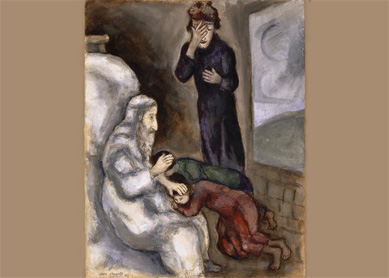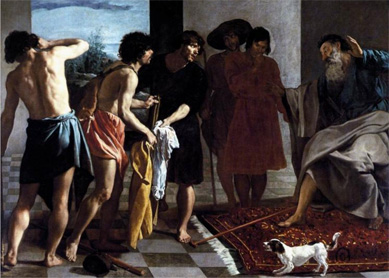Throughout the Hebrew Bible, key characters are often the youngest sons in their families. For example, Moses has two older siblings, Miriam and Aaron. David is the youngest of six brothers and is chastised by his eldest brother, Eliab, for leaving the family’s sheep and coming to watch the battle with the Philistines (
Within the narratives of Genesis, this sibling-conflict motif results in the first murder (
The Hebrew word bekhor can signify a number of things: “firstborn,” “firstfruits,” or, as a qualitative noun, “birthright.” When Cain and Abel offer their firstfruits, there is also an echo of a claim for priority or birthright over one another. So, within the first chapters of Genesis, divine favor plays a role in the countercultural prevailing of a younger son over his older sibling (even though Abel is killed because of it).
Coming much later in Genesis and after the struggles between other foundational sibling rivals (Isaac and Ishmael; Jacob and Esau), the story of Joseph and his brothers is a more complex and literary tale. Although Joseph is the eleventh son of Jacob (Israel), he is Rachel’s firstborn, so in a sense he is both firstborn and favored. The text specifically notes that “Israel loved Joseph more than any other of his children, because he was the son of his old age; and he had made him a long robe with sleeves. But when his brothers saw that their father loved him more than all his brothers, they hated him, and could not speak peaceably to him” (
As Joseph rises through the ranks in the Egyptian court (after some canny dream interpretation), his brothers come from Canaan, where there is a famine, to beg for food. Here, we begin to see how the folk motif of “the elder serving the younger” serves a larger political and theological purpose. Because the tiny kingdoms of Judah and Israel were vulnerable to much larger ancient Near Eastern powers such as the Egyptians, the Babylonians, and the Persians, this folk motif portrays God as supporting the more unlikely heroes, the “younger sons.” The implication, as Frederick Greenspahn writes, is “that the success of Israel’s ancestors was neither easy or expected, making Israel’s status both surprising and suspect.” The younger and weaker are still significant.
In a nice literary twist, toward the end of the Joseph narrative, Joseph brings his sons Ephraim and Manasseh for a blessing from Jacob. Jacob places his left hand on the eldest son’s head (Manasseh) and his right (the hand of blessing) on the youngest (Ephraim). Joseph is displeased that Jacob is not blessing his firstborn and tries to get him to switch hands, thinking that Jacob, in his blindness, is mistaken. Jacob responds, “I know, my son, I know; he also shall become a people, and he also shall be great. Nevertheless his younger brother shall be greater than he, and his offspring shall become a multitude of nations” (
Bibliography
- Havrelock, Rachel. “Genesis.” Pages 11–24 in The Oxford Handbook of the Reception History of the Bible. Edited by Michael Lieb et al. Oxford: Oxford University Press, 2011.
- Greenspahn, Frederick E. When Brothers Dwell Together: The Preeminence of Younger Siblings in the Hebrew Bible. Oxford: Oxford University Press, 1994.




